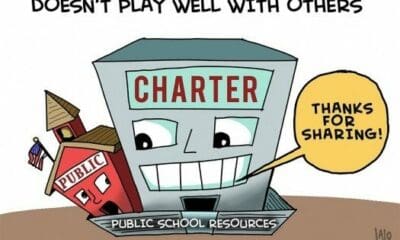

 This week the Partnership for Working Families released Transforming Trash in Urban America, a report that underscores the urgent need to reform the way America’s largest cities deal with their trash.
This week the Partnership for Working Families released Transforming Trash in Urban America, a report that underscores the urgent need to reform the way America’s largest cities deal with their trash.
The report reviewed the waste management infrastructure of the top 37 metropolitan areas in the United States and found that environmentally unsound waste disposal processes create strain on local budgets, degrade a city’s quality of life and seriously accelerate climate change. Nearly half of the cities involved have recycling rates in the teens or lower— significantly below the national average of 34 percent.
Transforming Trash presents San Francisco, Seattle and San Jose as models for reform. These cities have created sustainable recycling infrastructure that has notably decreased the amount of trash sent to landfills, while creating good jobs and stimulating local economies.
According to the report,
» Read more about: Transforming Trash Into Good Jobs and a Clean Environment »


 Two recent U.S. Supreme Court decisions involving especially high profile cases have garnered all the legal headlines. The Court’s watershed decision rejecting Proposition 8 and restoring the legality of same-sex marriage in California gave new rights to a significant portion of American citizens – and gave blue states something to shout about.
Two recent U.S. Supreme Court decisions involving especially high profile cases have garnered all the legal headlines. The Court’s watershed decision rejecting Proposition 8 and restoring the legality of same-sex marriage in California gave new rights to a significant portion of American citizens – and gave blue states something to shout about.
Days before, red states held their own party after a court majority ruled that the 1965 Voting Rights Act was unconstitutional because it relied on data from the 1970s that was supposedly outdated. Immediately, officials in North Carolina, South Carolina, Texas, Mississippi and Alabama – all states covered by the law – got to work adopting restrictions limiting the vote of the old, the poor and people of color.
Just before these two momentous decisions, however, when no one was paying attention, the high court gave the country to the corporations — again. The Supremes handed down a decision that curtailed the avenues that employees have used to redress instances of religious or racial discrimination.


— for the family of Trayvon Martin
This poem wants to write itself backwards.
Wishes it were born memory instead, skipping
time like a record needle stuck on the line
of your last second. You sit up. Brush not blood,
but dirt from your chest. You sit up. You’re in bed.
Bad dream. Back to sleep. You sit up. Rise and shine.
Good morning. This is the poem of a people united
in the uniform of your last day. Pockets full
of candy, hooded sweatshirt, sweet tea. This poem
wants to stand its ground, silence force
with simple words, pray you alive, anyone’s
son — tall boy, eye-smile, walk on home.
——————————————————–——————————————————–
Tara Skurtu is a Teaching Fellow at Boston University, a Robert Pinsky Global Fellow and recipient of an Academy of American Poets Prize.


For more than 30 years each, Cheryl Smith-Vincent and Cheryl Ortega have shared a passion for teaching public school in Southern California. Smith-Vincent teaches third grade at Miles Avenue Elementary School in Huntington Park; before retiring, Ortega taught kindergarten at Logan Street Elementary School in Echo Park. Both women have been jolted by experiences with a little-known statewide policy that requires traditional public schools to share their facilities with charter schools. Ortega says she has seen charter-school children warned against greeting non-charter students who attend the same campus. Smith-Vincent reports that she and her students were pushed out of their classroom prior to a round of important student tests – just to accommodate a charter school that needed the space.
“It was extremely disruptive,” Smith-Vincent says of the incident.
The practice of housing a traditional public school and a charter school on the same campus is known as “co-location.” Charters are publicly funded yet independently operated,
» Read more about: Why Charter Schools Are Tearing Public Campuses Apart »


 The New York Times recently reported on how small business owners in certain cities are dealing with paid sick days laws. The takeaway? These new requirements have caused very little pain. The article highlights Bill Stone, the owner of Café Atlas in San Francisco’s Mission District, who was initially leery of paid sick days for his employees back in 2007 when San Francisco became the first city in the nation to implement a paid sick leave law. In 2007 Bill felt that the new paid sick law would only make it more expensive to run his business.
The New York Times recently reported on how small business owners in certain cities are dealing with paid sick days laws. The takeaway? These new requirements have caused very little pain. The article highlights Bill Stone, the owner of Café Atlas in San Francisco’s Mission District, who was initially leery of paid sick days for his employees back in 2007 when San Francisco became the first city in the nation to implement a paid sick leave law. In 2007 Bill felt that the new paid sick law would only make it more expensive to run his business.
But Stone recognizes that his fears about paid sick days were unfounded. Robb Mandelbaum of the Times writes:
Six years later, Mr. Stone admits to having been a little alarmist about paid sick leave. “As a small restaurant business, it’s really hard to make money,
» Read more about: Paid Sick Days: Good Sense and Good Karma »


The so-called Global Alliance for Bangladesh Worker Safety, announced July 10 by Walmart, Gap and the Bipartisan Policy Center, was developed without consultation with workers or their representatives and is yet another “voluntary” scheme with no meaningful enforcement mechanisms. Companies that sign onto the alliance but fail to meet a commitment face no adverse consequences beyond expulsion from the scheme. Instead, workers will continue to pay.
In stark contrast, more than 75 corporations from 15 countries, including the United States, have signed the binding Accord on Fire and Building Safety negotiated with Bangladeshi and international unions. The Accord has rules to make real improvements in the safety of garment workers. Workers, unions and worker rights organizations negotiated this agreement with employers and integrated worker safety efforts by governments and the International Labor Organization (ILO). The AFL-CIO and Change to Win, along with global unions IndustriAll and UNI and numerous organizations representing Bangladeshi workers,
» Read more about: Walmart’s Worthless “Alliance” for Bangladesh Factories »


Is the full-time American job going the way of the dodo? The signs aren’t exactly heartening.
Consider the jobs report released Friday [July 5]. The United States added 195,000 new jobs in June, it said, including 322,000 new part-time jobs — a number that comprises only part-timers who want full-time work but can’t find it. Assuming my grade-school arithmetic skills haven’t completely eroded, that suggests that the number of full-time jobs actually declined.
Critics of Obamacare have a ready explanation: The 30-hour-a-week cutoff of the now-postponed employer mandate — which requires many employers to either provide health-care coverage for employees who work at least that much or to pay a penalty — was compelling employers to reduce workers’ hours. That mandate, the Wall Street Journal editorialized, gave businesses “an incentive to hire more part-time workers.”
If the employer mandate really were the problem,
» Read more about: The Full-Time Worker: A Vanishing American »


Ever since the emergence of talking pictures, schools have been a major subject of both Hollywood movies and documentary films. One consistent theme of Hollywood portrayals of schools – from Blackboard Jungle (1955), Up the Down Staircase (1967) and Stand and Deliver (1988) to Mr. Holland’s Opus (1995), October Sky (1999) and Freedom Writers (2007) – has been the idealistic teacher fighting to serve his and her students against overwhelming odds, including uncaring administrators, cynical colleagues, a stultifying required curriculum that crushes the spirit of teachers and students alike, dilapidated conditions, budget cuts, unruly and hostile students, or students suffering from the symptoms of poverty or neglect. The underlying message is that while occasionally a rare teacher can light a spark in a few students, our public schools are failing most of the students they are supposed to serve. Most documentaries about education –
» Read more about: A Harsh Schooling: The War Against Public Education »


 Before January 2009, the filibuster was used only for measures and nominations on which the minority party in the Senate had their strongest objections. Since then, Senate Republicans have filibustered almost everything, betting that voters will blame Democrats for the dysfunction in Congress as much as they blame the GOP.
Before January 2009, the filibuster was used only for measures and nominations on which the minority party in the Senate had their strongest objections. Since then, Senate Republicans have filibustered almost everything, betting that voters will blame Democrats for the dysfunction in Congress as much as they blame the GOP.
So far the bet is paying off because the press has failed to call out the GOP – which is now preventing votes on the President’s choices for three D.C. Circuit Court nominees, the Labor Department and the EPA, the Consumer Finance Protection Bureau, and the National Labor Relations Board. (The GOP has blocked all labor board nominees, some to whom the President gave recess appointments, but he’s now asking approval for all.)
The GOP has already violated hundreds of years of Senate precedent by filibustering the nomination of a Cabinet secretary, Chuck Hagel for Secretary of Defense,
» Read more about: Clinton Official: New GOP Hates Government and Governing »


I am a tipped worker at a restaurant, so according to Illinois law I only have to be paid 60 percent of the minimum wage, or $4.95 an hour. I am a single mother with a five-month-old son. I am worried because with the economy going so badly, people aren’t eating out as much or tipping as much. If things get worse and I can’t rely on my tips, then I am going to need to use things like food stamps. I am not able to save any money because I am living paycheck to paycheck, so if something unexpected happened I wouldn’t know what to do. We need this new law to raise the minimum wage because it would change the law for tipped workers so that they would get 100 percent of the minimum wage. We shouldn’t have to depend on something as unreliable as tips to survive.
» Read more about: Paycheck to Paycheck: Minimum Wage Stories »


 Governor Jerry Brown signed into law Thursday the “Governor’s Economic Development Initiative,” which radically overhauls California’s troubled Enterprise Zone program. The signing took place in San Diego at the headquarters of Takeda California, a pharmaceutical company. State legislature backers of the new program, which consists of Assembly Bill 93 and Senate Bill 90, say it will stimulate economic activity and create good jobs for Californians via a three-pronged approach.
Governor Jerry Brown signed into law Thursday the “Governor’s Economic Development Initiative,” which radically overhauls California’s troubled Enterprise Zone program. The signing took place in San Diego at the headquarters of Takeda California, a pharmaceutical company. State legislature backers of the new program, which consists of Assembly Bill 93 and Senate Bill 90, say it will stimulate economic activity and create good jobs for Californians via a three-pronged approach.
The first prong is a sales tax exemption on research and development equipment purchases for biotechnology and manufacturing firms. The second is a series of credits given to businesses that hire in regions with high unemployment and poverty rates. Finally, the initiative allows for California business to gain tax credits based on the quality and quantity of jobs they create.
The governor said he has supported this legislation in order “to help grow our economy and create good manufacturing jobs,” with a focus on building “the strength of intellectual capacity.”
» Read more about: Governor Signs Overhaul of Enterprise Zone Program »


 In my post last week, after the announcement that the employer mandate would not be enforced for a year, I wrote that it was vital that the Obama administration show as much concern for the workers who might be denied health insurance as it did for employers. Specifically, I asked the administration to make clear that a worker would be able to get subsidized health coverage through the new exchanges based on filling out an application, without having to get proof from an employer. On Friday [July 5, the Department of Health and Human Services] issued that ruling.
In my post last week, after the announcement that the employer mandate would not be enforced for a year, I wrote that it was vital that the Obama administration show as much concern for the workers who might be denied health insurance as it did for employers. Specifically, I asked the administration to make clear that a worker would be able to get subsidized health coverage through the new exchanges based on filling out an application, without having to get proof from an employer. On Friday [July 5, the Department of Health and Human Services] issued that ruling.
The decision not to enforce the employer mandate for a year is certain to cost some people health coverage as some employers decide to postpone complying with the law. Their workers, possibly also confused by the delay, may not apply for subsidized coverage. But if they do apply, the new ruling will be a big help to them.
» Read more about: How Obamacare Mandate Delay Helps Workers »


You’ve probably heard it from a colleague, or maybe from a friend or family member:
“Kids these days… they’re just too ambivalent to care about labor unions or workers’ rights.”
But as it turns out, that’s just not true. Young people are actually big fans of unions. Fully 61 percent of young people view labor unions favorably – and that’s more than 10 points higher than the national average, according to a new Pew poll. In fact, young people are the only age group that views unions more favorably than they view corporations.
But despite the overwhelming support young people have for unions, they’re far less likely to belong to one. Harold Meyerson writes in the American Prospect:
The irony for unions —and in theory, the opportunity—is that the youngest Americans are the least unionized.


Helicopters hover like hellish hogs
of Armageddon:
an infra-red shakedown.
We are the enemy, the face on the radio;
burnt petals cluttering the sidewalk.
We are daylight’s demise, dancing between
discord & distrust. All is bitter harvest,
betrayal and bewilderment;
all is seed for the fields of retreat:
bullets punctuate every poem.
——————————————————–
Source: Trochemoche, published by Curbstone Press (1998).
Luis Rodrίguez has won numerous awards for his poetry, including the Poetry Center Book Award, a PEN Josephine Miles Literary Award, and a Paterson Poetry Book Prize. He is best known for the 1993 memoir of gang life, Always Running: La Vida Loca, Gang Days in L.A. (paperback by Touchstone Books/Simon & Schuster).


Tomorrow the fate of Chinatown residents and small businesses will be decided by the Superior Court. For the past 18 months, Chinatown residents and community activists across the city have been fighting Walmart’s attempt to open a grocery store in the historic downtown neighborhood. Now a judge will weigh the right of Asian-American communities to have a voice in what is built in their neighborhoods versus a multinational corporation’s ability to open just one more store. The lawsuit filed by the Asian Pacific American Labor Alliance (APALA) and its allies seeks to nullify the building permits granted to Walmart by L.A. city officials.
As we at APALA prepare for the trial, I have been reflecting on our civil rights and labor struggles in the Asian-American community. It’s the same battle that Chinatown residents fought against Union Station displacement and that Japanese Americans fought to reclaim Little Tokyo in the wake of internment camps and recent gentrification.


 Judy West is a founding member and current president of Local 741 of the American Federation of State, County and Municipal Employees union (AFSCME). She also works for the Los Angeles Department of Recreation and Parks as a recreation assistant and teaches “parent-and-me” classes. The department’s only fulltime employees are its directors and other administrators – assistants like West work halftime. Frying Pan News reporter Luke Dowling sat down with her to talk about the state of unions in Los Angeles.
Judy West is a founding member and current president of Local 741 of the American Federation of State, County and Municipal Employees union (AFSCME). She also works for the Los Angeles Department of Recreation and Parks as a recreation assistant and teaches “parent-and-me” classes. The department’s only fulltime employees are its directors and other administrators – assistants like West work halftime. Frying Pan News reporter Luke Dowling sat down with her to talk about the state of unions in Los Angeles.
Frying Pan News: Tell me a little about yourself and how you came to be president of AFSCME Local 741.
Judy West: I was one of its organizers and was treasurer for a while, then became president. We had nothing before we organized. When a union rep came in and said, “We’ve been asked by different rec assistants to organize a union,” I said,


You get the basics in high school. The federal government is divided into three branches (executive, legislative, judicial). Locally you’ve got the mayor and the city council. Etc. Most of us don’t graduate with enough knowledge so that as adults we truly grasp how even the most well-known governmental power structures really work (what percentage of Americans can actually explain the Electoral College?), let alone more obscure power centers.
The Long Beach Coalition for Good Jobs and a Healthy Community is aiming to redress this lack of knowledge through a series of Power Analysis Workshops (or PAWs), which the coalition says are intended “to build collective knowledge of the power of local government [, …] of where branches of government get their power, how they impact the community and how residents can ensure local government works for all residents.”
“It’s important that all residents are engaged in the political process and understand how the decisions their representatives make impact their daily lives,” says Christine Petit,
» Read more about: Teaching the ABCs of Power in Long Beach »


 An old friend I’m back in touch with thanks to Facebook loves to rail against Facebook — on Facebook. When our electronic bond progressed to a real-world lunch, he lamented that he had joined Facebook for its networking promise, but has become unnerved by a growing sense that his Facebook Page belongs not to him but to, yes, Facebook.
An old friend I’m back in touch with thanks to Facebook loves to rail against Facebook — on Facebook. When our electronic bond progressed to a real-world lunch, he lamented that he had joined Facebook for its networking promise, but has become unnerved by a growing sense that his Facebook Page belongs not to him but to, yes, Facebook.
I could relate. A bizarre posting or a stealth ad on Facebook can trigger a flash of disorientation. Does it emanate from a friend, a friend of a friend, a mutual friend, a frenemy posing as a friend, someone I “should get to know” or a multi-national corporation? How did those unflattering pictures of me insinuate themselves, unbidden, into my profile? And how can it be that I’m now, at this precise instant, listening — “on Spotify” — to a song I’ve never heard of?
It might be satisfying for counter-culture types to blow off steam by rebelling against a mega-corporation that markets itself as the hip vanguard of the communications revolution to mask its true establishment-promoting,


In a far-reaching victory for hotel workers, a new labor agreement has been reached between the national Hyatt hotel chain and UNITE HERE, which represents Hyatt workers in Los Angeles, San Francisco, Hawaii and Chicago. The accord caps a long, tenacious fight by the union. In a memo emailed to union affiliates, UNITE HERE national president D. Taylor thanked union activists and elected leaders whose efforts over the last two years have led to “substantial wage increases and quality health and pension benefits.”
The two sides issued this joint statement last week:
National Agreement
Today Hyatt Hotels Corporation and UNITE HERE, the union of hospitality workers in the U.S. and Canada, announced a national agreement that resolves longstanding disputes between the two organizations. The agreement creates a framework for the company and the union to work together moving forward. Both UNITE HERE and Hyatt hailed the pact as a positive step.